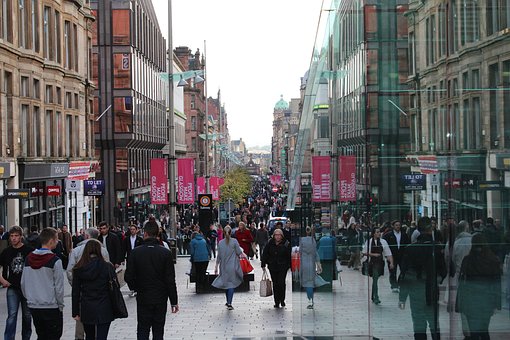Scottish retailers report worst December sales in 20 years

The last month of 2018 saw Scottish sales decrease by 1.2 per cent on a like-for-like basis compared to December 2017, when they had increased by 0.3 per cent - this is above the three-month average of -1.3 per cent.
In December, Total sales in Scotland decreased by 1.0 per cent compared with December 2017, when they had increased by 0.8 per cent.
This is the worst December outcome since 2014.
It is lower than the three-month average of -0.9 per cent and pulls the twelve-month average to 0.3 per cent. the lowest since May. Adjusted for inflation measured at 0.3 per cent by the BRC-Nielsen Shop Price Index (SPI), December sales decreased 1.3 per cent, the lowest since the SRSM began in 1999.
Total Food sales in December increased 1.3 per cent versus December 2017, when they had increased by 4.4 per cent. This is the lowest since February 2017, excluding Easter distortions and below both the 3-month and the 12-month averages of 2.1 per cent and 3.6 per cent respectively. The 12-month average is the lowest since December 2017. The 3-month and 12-month averages are above the UK’s levels of 1.8 per cent and 3.1 per cent respectively.
Total Non-Food sales decreased 2.8 per cent in December compared to December 2017, when they had decreased by 2.2 per cent. This is above the 3-month average of -3.3 per cent but below the 12-month average of -2.3 per cent.
Adjusted for the estimated effect of Online sales, Total Non-Food sales decreased by 1.0 per cent in December versus December 2017, when they had decreased by 0.4 per cent. This is the lowest December outcome for Non-Food since 2008. On a three-month basis, the Online-adjusted Total Non-Food sales decreased by 1.6 per cent, the lowest since April and below the UK Non-Food average of -0.4 per cent.
Ewan MacDonald-Russell, head of policy & external affairs at Scottish Retail Consortium, said: “There was little Christmas cheer for retailers with the worst real term December sales figures in twenty years. Whilst the dip was less pronounced than that witnessed the previous month, it’s clear stores have suffered as consumer spending is pared back under pressure from inflation, rising household costs and against a backdrop of uncertainty.
“Food sales continue to grow, albeit at the lowest level since February 2017. Most of that growth is the consequence of food inflation, with consumers buying little more than the previous year. Regrettably non-food sales continue to decline, best symbolised by weak sales of Christmas decorations as consumers chose to reuse older baubles rather than splash out on new items.
“Christmas is the key trading period for retailers so these figures bookend an underwhelming 2018 for the industry. Nonetheless, despite the gloom retail sales actually grew by 0.3 percent last year, in line with recent Scottish GDP figures. What should concern policymakers more is sluggish retail sales can be a warning light for the wider Scottish economy. With political and economic uncertainty likely to continue, there may continue to be challenges ahead in 2019.”
Paul Martin, UK head of retail at KPMG, said: “Festive spending didn’t flourish in December as retailers hoped, with total sales in Scotland dropping 1.2 per cent on a like-for-like basis compared to the same period last year.
“Retailers were generous with discounts and other promotional offers throughout the month, but this wasn’t enough to encourage shoppers to the high street. Even taking into account online sales, total non-food sales declined by one per cent, the lowest December on record since 2008.
“There was some relief for retailers as food sales increased by 1.3 per cent – one of the few categories to experience growth. However, the contrast in performance between the high street and online was plain to see in December, even though 2018 saw a slowdown in online retail sales.
“2018 has been an extremely tough year for retailers, and as we enter 2019, the focus should be on remaining resilient in the face of both known and unknown factors.”





